In this article:
Our stomach has a naturally acidic pH, which is essential for the digestion of food and killing any ingested bacteria. However, sometimes due to various reasons, the stomach produces excessive digestive acids, more than what is required for the digestion of food.

The surplus of this acidic juice causes discomfort such as a burning sensation in the stomach, difficulty swallowing, belching, nausea, indigestion, bad breath, constipation, regurgitation, restlessness, and a burning sensation in the throat and heart (also known as heartburn).
Acidity is a fairly common problem that affects people of all ages from time to time. Those who suffer frequently from such acidity problems are said to have an “acid stomach.”
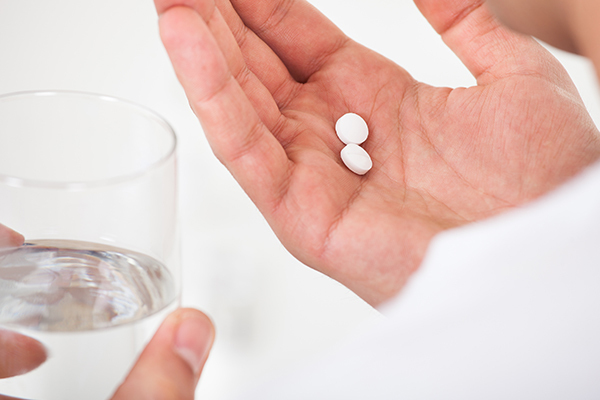
While there is no replacement for the doctor-recommended antacids and medicines for tackling GERD, there are some adjunctive measures that you can adapt to enhance the efficacy of traditional treatment.
Complementary healing is a mixed bag that includes dietary changes, lifestyle modifications, and natural remedies using commonly available kitchen ingredients to get relief from stomach acidity.
Here are some tried-and-tested ways to relieve acidity at home.
1. Use baking soda as an antacid
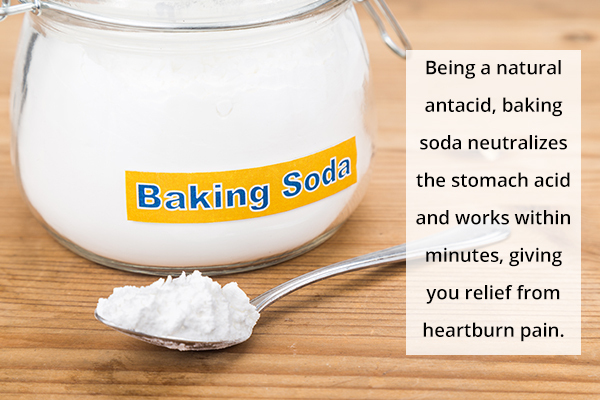
Baking soda, also known as sodium bicarbonate is considered a good home remedy for acidity as it provides quick and easy relief from heartburn. Being a natural antacid, it neutralizes the stomach acid and works within minutes, giving you relief from heartburn pain. (1)
- Mix 1 teaspoon of baking soda into 1 glass of water.
- Optionally, you can mix in a few drops of lemon juice.
- Drink this solution for instant relief.
- Repeat this two to three times daily, if needed.
Caution: Any kind of antacid should not be given to children under 6 years of age. Always take the recommended dosage, as high amounts of baking soda can cause severe metabolic alkalosis and may sometimes induce gastric rupture.
2. Consume ginger
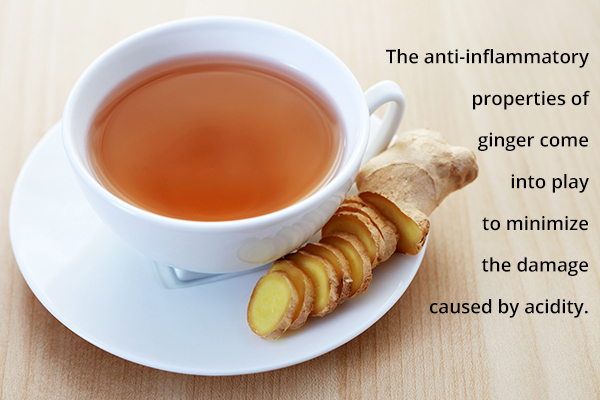
The anti-inflammatory properties of ginger come into play to minimize the damage caused by acidity. It also helps combat the H. pylori bacteria responsible for the condition, and it works to neutralize stomach acids. (2)(3)
- When experiencing acidity, just chew a slice of fresh ginger.
- You can also put some fresh ginger slices in a cup of boiling water, let it steep for a few minutes, and then drink the liquid.
- A spoonful of ginger juice taken two to three times a day can also provide relief from acidity.
3. Try consuming fennel seeds
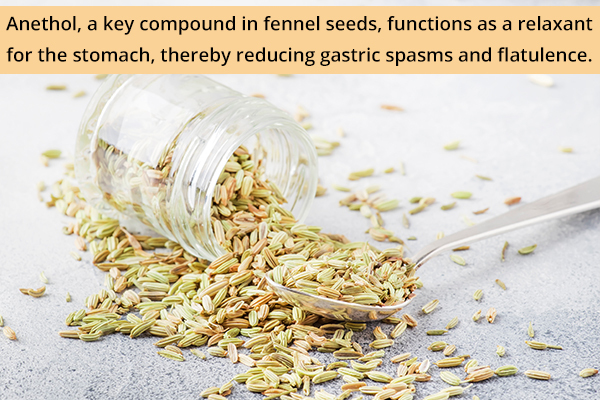
Fennel is another kitchen staple enriched with carminative properties that aid digestion. Anethole, a key compound of fennel seeds, functions as a relaxant for the stomach, thereby reducing gastric spasms and flatulence.
Moreover, fennel soothes the lining of the stomach and prevents indigestion or constipation. (4) The fact that it is fibrous in nature and loaded with vitamins and minerals only helps its case as a digestive aid.
- Simply chew some fennel seeds after eating a heavy or spicy meal.
- You can also steep 1–2 teaspoons of fennel seeds in 1 cup of hot water. Strain the liquid and drink it a few times a day.
4. Sip on some buttermilk
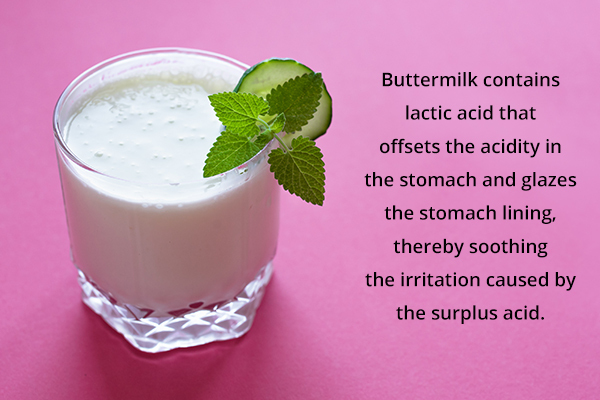
Buttermilk is an excellent home remedy for acidity as it curbs the irritation in the gastrointestinal tract caused by a severe case of acidity. It contains lactic acid that offsets the acidity in the stomach and glazes the stomach lining, thereby soothing the irritation caused by the surplus acid.
What makes buttermilk all the more renowned for being a digestive aid is the fact that it is a natural probiotic. Although readily available in grocery stores, this quick-fix remedy can easily be whipped up at home. (5)(6)
- Grind ½–1 teaspoon of fenugreek seeds with a little water to make a paste. Mix it in a glass of plain buttermilk, and consume it to relieve stomach ache caused by acidity.
- You can also simply drink plain buttermilk several times a day until you get relief. Mix in a little black pepper or 1 teaspoon of ground coriander leaves for best results.
5. Consume cumin seeds
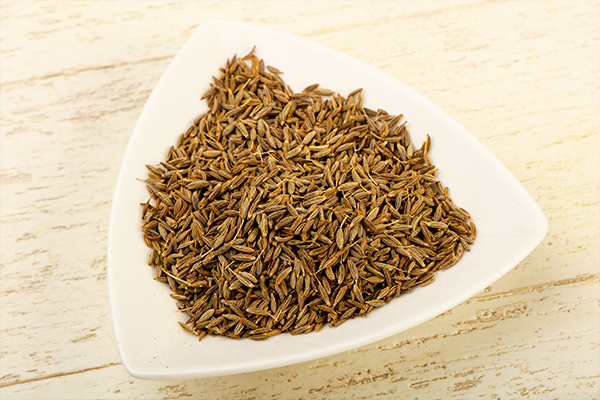
Cumin seeds can also be considered as one of the important home remedies for acidity as cumin works as a great acid neutralizer. Also, it aids in digestion and relieves stomach pain. (7)
- Slightly crush some roasted cumin seeds and stir the crushed seeds into 1 glass of water. Drink the mixture after every meal.
- You can also boil 1 teaspoon of cumin seeds in 1 cup of water, strain the liquid, and then drink it after your meal.
- Another option is to mix 1 teaspoon each of coriander seed powder, cumin seed powder, fennel seed powder, and some sugar in ½ cup of water. Drink this mixture on an empty stomach.
6. Drink aloe vera juice
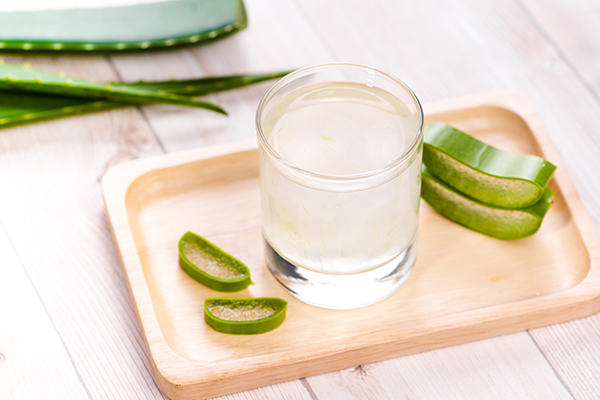
The juice extracted from the aloe vera plant is a popular home remedy for heartburn. Aloe vera juice controls heartburn by reducing inflammation and healing the gastrointestinal tract. It also boosts digestion and removes toxins from the body.
A 2015 study published in the Journal of Traditional Chinese Medicine reports that aloe vera juice can reduce the symptoms of acid reflux without any side effects. Researchers noted that aloe vera reduces acid production by acting as an anti-inflammatory agent. (8)
For best results, drink ¼ cup of aloe vera juice 20 to 30 minutes before eating a meal. Be careful not to drink too much of it in one day, as it can cause diarrhea and abdominal pain.
7. Munch on some basil leaves
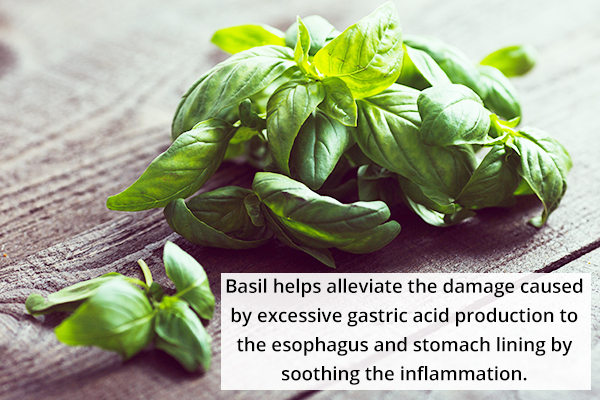
Basil leaves exhibit potent carminative properties that help relieve heartburn and nausea. It does so by stimulating the stomach to produce more mucus, which helps cancel out the acidity. (9)
Furthermore, basil helps alleviate the damage caused by excessive gastric acid production to the esophagus and stomach lining by soothing the inflammation. Basil also helps with flatulence and is believed to possess anti-ulcer properties.
- Simply eat some basil leaves at the first sign of acid upset. Be sure to chew them thoroughly.
- Another option is to boil three to five basil leaves in 1 cup of water and then let it simmer for a few minutes. You can sweeten this basil tea with honey. Do not add milk, though. Sip it frequently.
Note: Basil leaves and basil oil should not be consumed in high doses as these contain estragole, a chemical that is associated with the risk of getting liver cancer.
8. Consume diluted apple cider vinegar
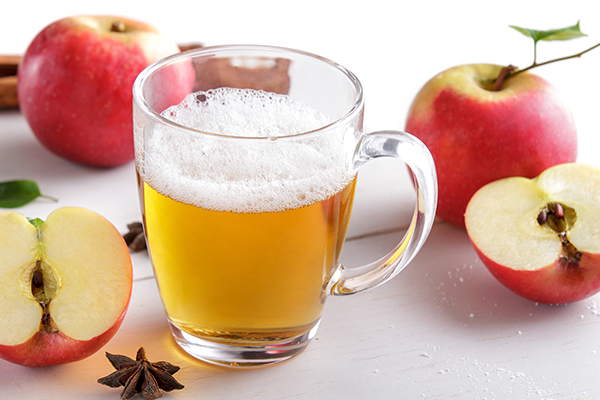
Though acidic in nature, apple cider vinegar has an alkalizing effect when ingested. This makes it extremely effective in treating stomach acidity and therefore we have included it as an acidity home reemdy. (10)
- Simply mix 1–2 teaspoons of raw, unfiltered apple cider vinegar in 1 cup of water.
- Drink the solution once or twice a day. You can also drink it before meals.
Lifestyle changes
Incorporate the following lifestyle modifications to avoid high acidity levels.
1. Stay away from spicy food
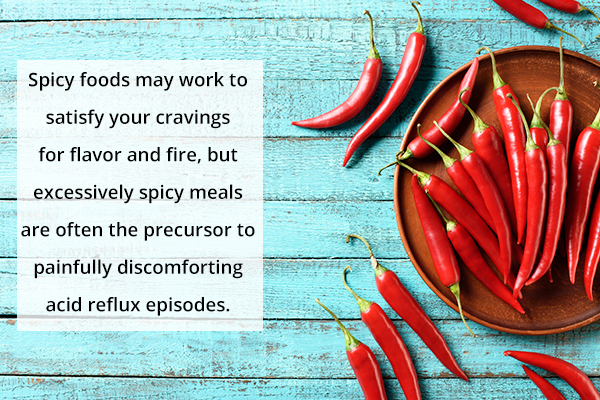
Spicy foods that set your mouth on fire tend to do the same to your digestive tract. A lot of people take pleasure in eating such fiery meals that can make them salivate and break into a sweat all at once. While some have the threshold to stomach this heat, a great many often have to deal with digestive discomfort later.
Besides tingling your taste buds, spicy foods are known to trigger a burning sensation in your belly. They may work to satisfy your cravings for flavor and fire, but excessively spicy meals are often the precursor to painfully discomforting acid reflux episodes.
It is, therefore, absolutely essential that you don’t go overboard on the spicy stuff, especially if you are prone to acidity.
Some of the common acidity-inducing culprits to avoid: (11)
- Wasabi
- Chili powder
- Hot peppers
- Horseradish
- Cayenne pepper
- Hot sauce
- Red chili pepper flakes
2. Eat regular meals and small portions
An unhealthy, unbalanced, and irregular eating pattern is just as culpable for triggering acidity and heartburn as your food choices. Many a time, it is how you go about consuming your meals than the actual meal itself that makes it difficult for you to keep the stomach acids down.
Stuffing your stomach with large food portions or eating more than you feel hungry for is almost always a recipe for heartburn. (12) When your stomach becomes excessively full, the valve between your stomach and esophagus relaxes, thereby allowing the backflow of stomach acids into the esophagus.
If you have an erratic dietary schedule such that you skip meals or go without eating for long periods, you are more likely to overeat at your next meal.
It is recommended to keep your portion size small and eat several small meals at regular intervals. Adhering to the standard routine of three large meals a day will only contribute to your digestive distress if you are a GERD patient.
Another pro-tip to keep your acidity under control is to have your last meal at least 3 hours before you call it a day. Maintaining a gap between dinner and bedtime allows your digestive system to process the food adequately. (13)
3. Stop smoking

People who smoke are at an increased risk of heartburn and GERD. This association can be explained by the harmful effect of nicotine found in cigarettes. Nicotine renders the lower esophageal sphincter quite weak and dysfunctional. (14)
The lower esophageal sphincter acts as a buffer that allows the food to pass through the food pipe into the stomach but keeps the stomach contents from flowing back into the esophagus.
4. Elevate the head of your bed
If heartburn has been giving you sleepless nights, use gravity to your advantage to keep the acid reflux in check. The ideal sleeping position for this purpose involves placing your head on a raised level as compared with the rest of your body.
Sleeping at a slight incline helps to push the stomach contents downwards, thereby preventing acid reflux. You can either prop some extra pillows under your head, but this method may not always yield results.
In such cases, you may want to elevate the head end of the bed altogether. The recommended height of the bed head elevation is 6 to 9 inches, which can be achieved by placing wood or cement blocks under the feet of your bed.
You can even insert a foam sleeping wedge between your mattress and box spring to elevate your body from the waist up. (15) These sleeping aids are extremely effective against GERD and are easily available at most drugstores and medical supply stores.
5. Maintain a healthy weight
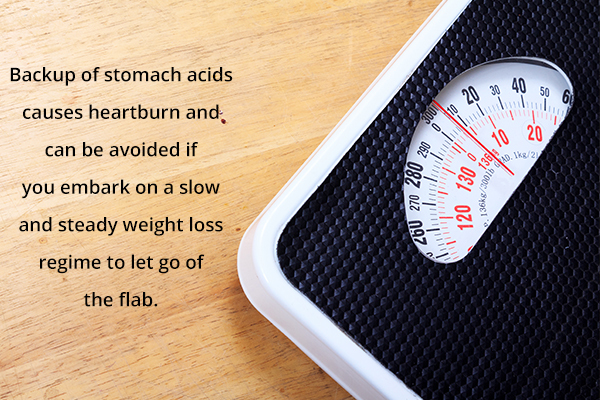
The importance of maintaining a healthy body weight cannot be stressed enough in combating digestive troubles such as acidity, GERD, and heartburn.
If you are overweight or obese, the extra pounds around the abdomen put pressure on the stomach, pushing its contents upwards into your esophagus. This backup of stomach acids is the source of your heartburn and can be avoided if you embark on a slow and steady weight loss regime to let go of the flab.
There is no need to sign up for an extreme diet or exercise routine to lose all the weight at once. Instead, you should work with your doctor and nutritionist to come up with a weight loss plan that is customized to your individual needs. Aim to lose no more than 1 or 2 pounds (0.5 to 1 kilogram) a week.
If your weight is healthy, maintain it. (16)(17)
6. Avoid alcohol
If you are prone to acidity, alcohol consumption only worsens your digestive woes. It weakens the lower esophageal sphincter much in the same way as cigarette smoking does. Thus, the barrier function of the sphincter between the stomach and esophagus becomes compromised, paving the way for increased acid reflux. (18)
Alcohol consumption was also found to be associated with active H. pylori infection by a study published in Alcohol and Alcoholism. (19) Besides, alcohol tends to increase the acidic content of your stomach, which can cause severe stomach pain, vomiting, and diarrhea.
7. Chew gum
Chewing a piece of sugar-free gum can provide quick relief from acidity and heartburn. Chewing gum stimulates the production of saliva and causes your saliva to become more alkaline. This can neutralize the acid in your stomach.
A study published in the Journal of Dental Research reports that chewing sugar-free gum for half an hour after a meal can reduce acidic postprandial esophageal reflux. (20)
After a meal, chew a piece of sugar-free gum for 30 minutes to help ward off acidity and the burning sensation in your chest and stomach. However, avoid sugary and mint-flavored gum.
How to Treat Acidity
The first and foremost step towards addressing acidity is to identify the foods that trigger your symptoms and eliminate them from your diet. If you cannot swear off a particular food altogether, keep its intake to a very minimal. See if this elimination diet works to bring you adequate relief.
If your heartburn symptoms continue unabated despite the recommended dietary and lifestyle modifications, you may want to consider over-the-counter or prescription medication.
Your doctor will take into account all the relevant health factors before prescribing the appropriate medicines, such as antacids, for your particular case.
Over-the-counter H2 blockers such as Tagamet (cimetidine) and Zantac (ranitidine) are recommended for people who fail to register any kind of substantial relief from antacids. These drugs work by reducing stomach acid production to provide longer-lasting relief from heartburn.
Additionally, proton pump inhibitors (PPIs), such as Prilosec OTC (omeprazole) and Nexium 24HR (esomeprazole), may be prescribed to bring down the stomach acid production even further. People with a severe case of acidity may have to undergo surgery (vagotomy) to curb the acid production in the stomach.
Anecdotal Remedy
The following remedy is neither backed by scientific evidence nor reviewed by our health experts. Nonetheless, a number of general users have reported an improvement in their condition using this anecdotal remedy.
Jaggery

Jaggery aids digestion and has an alkalinizing effect on the digestive system; thus, it reduces stomach acidity. It is, therefore, a good idea to chew on a bit of jaggery as a post-meal ritual. You can buy jaggery at most Indian or Asian grocery stores.
After each meal, suck on a small piece of jaggery until the acidity subsides.
Note: This remedy is not suitable for people who have diabetes.
Prevention of Acidity
The tips given below can help prevent high acidity levels.
- Losing weight if you are on the heavier side is a good start to get rid of your acidity problem.
- Identify and avoid the foods that tend to trigger an acidic reaction in your stomach.
- Eat smaller meals and eat at regular intervals.
- Keep an optimum time gap of 3 hours between dinner and going to bed.
- Abstain from smoking and limit your alcohol intake.
- Review your medications to identify potential culprits for acidity, and then consult your doctor about possible substitutes for the same. However, never stop taking a prescribed drug of your own volition; a doctor’s approval is a must.
- Cut down your intake of caffeine and carbonated beverages.
- Incorporate fiber-rich foods, which aid digestion, in your diet.
- Minimize the intake of red meat.
- Avoid unnecessary snacking and eat only when you feel hungry.
- Chewing gum can help stimulate your salivary glands, and the resulting saliva secretion aids digestion.
Causes of Acidity
The following factors can lead to acidity issues in the stomach.
- Bacteria by the name of Helicobacter pylori is said to be responsible for a variety of gastric problems. It damages the stomach lining and increases the discomfort caused by the acid secretion in the stomach.
- Improper dietary habits such as overeating, eating too close to bedtime or just before taking a shower, not eating at regular times, and allowing long gaps between meals.
- Bingeing on acidic, spicy or junk food and eating a high-fat diet.
- Excessive intake of coffee, tea, chocolate, or carbonated drinks.
- Excessive alcohol consumption and smoking.
- Inadequate sleep.
- Medical conditions such as asthma, hiatal hernia, peptic ulcers, and diabetes can all make you increasingly susceptible to acidity issues.
- As a side effect to certain medicines such as nonsteroidal anti-inflammatory drugs (NSAIDs), antibiotics, bisphosphonates, and drugs to treat high blood pressure, anxiety, and depression.
- Pregnancy or the onset of menopause.
- A sedentary lifestyle and lack of exercise.
When to See a Doctor
You should see your GP if:
- You are suffering from chronic acidity that is only temporarily relieved by over-the-counter medicines or changing your diet.
- You experience difficulty swallowing.
- You suffer from persistent nausea or vomiting.
- You have poor appetite or difficulty eating, inadvertently resulting in weight loss.
- Heartburn can occur frequently and interfere with your routine; if this is the case, you may be suffering from gastroesophageal reflux disease (GERD).
You should consult your GP as soon as possible as untreated GERD can seriously damage your esophagus or it can indicate some more serious medical conditions such as peptic ulcers, irritable bowel disease, or rarely stomach cancer.
Additional Tips

- If you frequently suffer from acidity, drink a glass of lukewarm water every day before going to sleep and immediately after waking up in the morning. Do not drink water during or immediately after a meal though, as it can lead to improper digestion that can contribute to acidity.
- Sleeping on your left side has shown to have some positive results in curbing acidity.
- Was this article helpful?
- YES, THANKS!NOT REALLY


